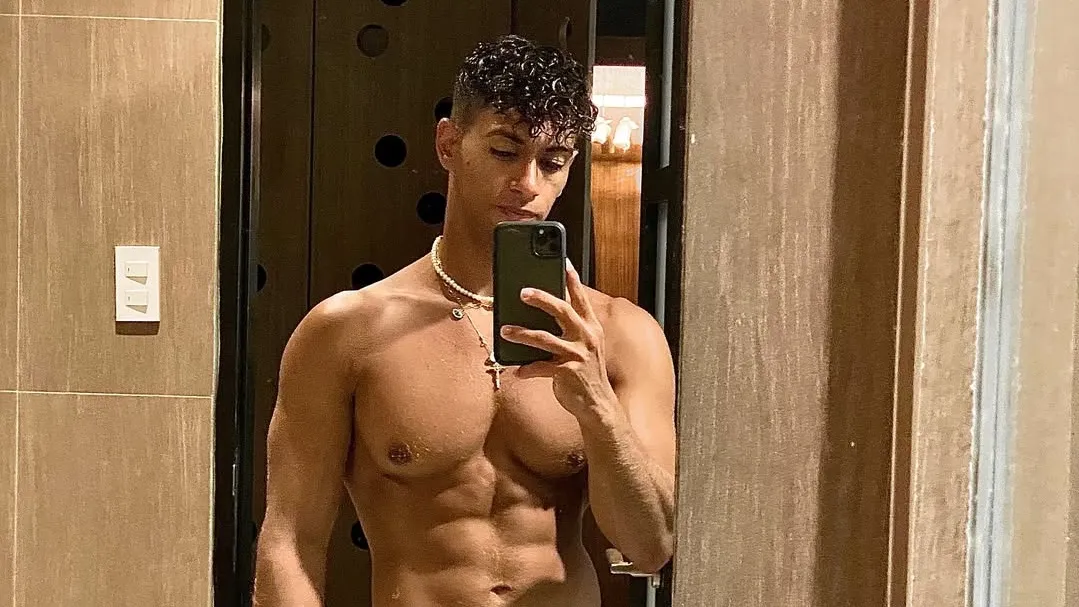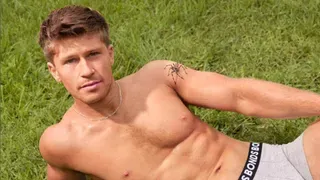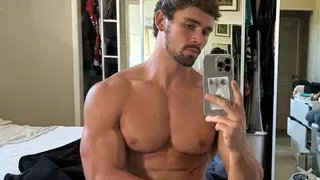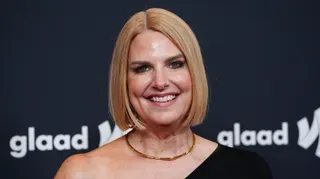September 29, 2024
Drag Queen Pattie Gonia Aims to Give the Climate Movement a Makeover with Joy and Laughter
Peter Prengaman and Brittany Peterson READ TIME: 7 MIN.
Dressed in a sequin-laced, sleeveless top and puffy pink skirt, drag queen Pattie Gonia strides around the stage in white high-heeled boots that come up to the knees, telling the crowd that nature must be a woman.
"She is trying to kill us in the most passive-aggressive way possible," joked Gonia, lip-syncing audio from a routine by comedian Michelle Wolf. "It's not some sort of immediate fire or flood or a cool explosion. She's just like, 'What? I raised the temperature a little.'"
"Are you uncomfortable?" continued Gonia, who has a neatly trimmed mustache, long black eyelashes and a wig of long and flowing red hair. "Maybe I wouldn't have (raised the temperature) if you had taken out the recycling, like I asked!
Just as the crowd begins laughing, a large screen over the stage flashes a picture of a 2011 tweet from singer Britney Spears asking, "Does anyone think global warming is a good thing?" As Gonia points to the screen, she begins lip-syncing the Spears song, "Toxic."
In its second year at New York Climate Week, "Save Her! Environmental Drag Show" has become a popular attraction during the event that includes hundreds of panels, activities and meetings with scientists, activists, executives from green energy companies, politicians and many others.
The show aims to inspire the audience to talk about climate change, caused by the burning of fuels like gasoline and coal, while making people laugh. The show combines disparate things to create absurdities, such as changing the lyrics of Katy Perry's "Fireworks" song to, "Baby, you are a plastic bag," while Gonia pulls plastic bags from her breasts. While drag queens and drag kings enact scenes that could be interpreted as metaphors for harming or preserving the Earth, like crashing a car or riding a bike, somber statistics flash on the screen, like 20 large corporations are responsible for a large portion of all the greenhouse gases being released into the atmosphere and heating the planet.
There are also public service announcements, like when drag king Uncle Freak performed while images of Smokey Bear appeared above, encouraging audience members to take care of the forests.
Gonia, who at well over six feet tall cuts a striking figure, created the show, which includes outfits largely made of reused clothes, to combine her passion for the outdoors and environmentalism. But getting to that point was a long, and sometimes painful, road.
High heels go viral
Raised in Nebraska, Gonia, whose legal first name is Wyn, grew up feeling close to nature but struggled with their queer identity. After coming out, Wyn, who asked that their last name not be used because of issues with doxing, said acceptance for many friends and family members meant it was okay to be a gay man but not act as one. That expectation was underscored the first time Wyn dressed in drag, at the end of a conference in 2018.
The experience was exhilarating, but everything quickly turned negative.
"There was a deafening silence from friends and family back home," said Wyn during an interview.
After months of being depressed, later that year Wyn, who now lives in Bend, Ore., went on a camping trip with friends along the Continental Divide in Colorado – and posted a clip wearing high heels.
"I woke up to a video I thought would have 30 views that had 3 million views," said Wyn.
Pattie Gonia was born.
Arts and climate
"Save Her!" is part of a larger trend of art and popular culture that increasingly wrestles with climate change. Around the world, there are numerous art exhibitions, interactive museum displays and movies that recount environmental degradation, Indigenous peoples' stewardship of land, forced migration and numerous other issues related to climate change. It's a far cry from two decades ago, when environmentalist and author Bill McKibben wrote in an op-ed for Grist that art was crucial to combat climate change.
"Where are the books? The poems? The plays?" wrote McKibben.
Helen Clarkson, CEO of Climate Group, which organizes New York's Climate Week, said the annual gathering has morphed from its start in 2011, when it was largely focused on climate as a business issue, to one that now includes hundreds of varied events, including poetry readings, plays and art exhibitions.
"The creative industries are really important for anything where you're trying to connect with people, bring the subject alive," said Clarkson. "What I don't want is anyone to ever be like, 'Do you end up with hope or do you end up with despair?'"
"Save Her!" wants people to walk away with hope. For every negative highlighted, the show appears to provide a positive anecdote. For example, drag queen Nini Coco, dressed as a butterfly, takes the crowd through the life cycle of Monarch Butterflies, which migrate from Canada and the United States to Mexico and then back again. Their populations have plummeted amid climate change.
Like in real life, in the show the butterflies die, but then the act ends with rebirth, a caterpillar turning into a butterfly.
"I hear about climate change a lot, but this makes it more real, more tangible," said Heath Koch, a 27-year-old product designer who attended Tuesday night's show.
Criticism of climate movement
The desire to inspire doesn't mean Gonia is ready to give a pass to many climate activists.
"The climate movement needs a makeover," said Gonia, arguing that many New York Climate Week events, and those at other large climate meetings, are exclusive, not inclusive. Many meetings are not open to the public, and some that are don't allow for a multitude of voices, said Gonia.
"The climate community, they like to think they are these amazing, liberal, open-minded accepting people. Sometimes it's the meanest girl table I've ever sat down at," said Gonia.
But Gonia has also found some partnerships in the mainstream climate movement.
Earlier this year, as part of a paid promotion, Gonia made a punchy video on misconceptions about prescribed burns, or purposely burning swaths of forests as part of general land management. Dressed in a red and black gown crafted to resemble a flame, she and a state fire director at The Nature Conservancy did a funny, educational bit in the middle of a forest. They used humor to poke fun of people reluctant to embrace prescribed burns or engage at all.
The video received 210,000 likes, over 1,700 comments and over 14,000 shares between Instagram and TikTok. It skyrocketed to The Nature Conservancy's second highest performing reel on Instagram.
"That is why we love working with influencers like Pattie, because she's a master at it," said Todd Metrokin, the nonprofit's director of brand strategy.
Gonia said that ultimately she and other performers are communicators that bring more people into conversations about climate change.
"We are cutting through noise that corporations with 100 employees can't cut through," Gonia said.
___
Peterson reported from Denver.
___
The Associated Press' climate and environmental coverage receives financial support from multiple private foundations. AP is solely responsible for all content. Find AP's standards for working with philanthropies, a list of supporters and funded coverage areas at AP.org.







